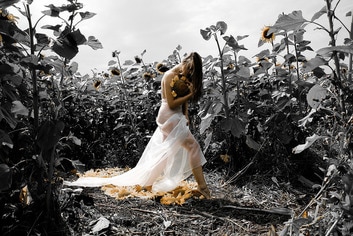
I recently completed training with the University of Melbourne to become a facilitator of their parenting program, Tuning In to Kids.™ This program focuses on using our children's emotions as an opportunity for connection and closeness. Parents teach their children the skills of emotional intelligence, problem solving and setting limits where required.
In a nutshell, this program teaches parents to be emotionally responsive to their children as well as helping them understand and manage their own emotions.
This training got me thinking about my own childhood and how my parents raised me. Emotional development wasn't really on the agenda. Of course, they were doing their best. As we all do, given the resources we have at the time. However, looking back on my upbringing, I realise it taught me so much about the importance of understanding emotions.
Some of you would have been raised within the strict discipline model as a path to good behaviour, others would have had experiences of their emotions being dismissed and glossed over. Perhaps your parents used food or other distractions. Some parents can be disapproving of their children's emotions. Perhaps you were criticised for having an emotion like fear. You may have been told to "stop being silly, there are no monsters under the bed." You may have been constantly corrected or even punished for expressing a particular emotion. Or you may have been allowed to express your emotions yet not have had boundaries set or help with understanding your emotions and how to deal with them.
These early experiences in childhood lead us to form certain attitudes about emotions. As adults, it helps to become aware of our beliefs about emotions, what we think and feel about our emotions. Psychologists call this meta-emotion. The emotions we have about our own emotions. We often judge ourselves for expressing certain emotions. For example, a friend of mine was feeling upset and burst into tears. She immediately began trying to contain her emotions, excuse them and apologised to me for crying.
What do you believe about emotions? Some emotions, like happiness and laughter may be acceptable to you, whilst anger is something you have to hide and act like everything is fine. Crying may be something you do in private, or a sign of weakness.
Our beliefs form part of our subconscious mind, creating unconscious emotional and behavioural patterns that are played out. These patterns can hold us back and keep us stuck.
Some of the words you may remember hearing when you were a child, in relation to sadness and crying, include: "That's not something to cry about." Or the popular, "Stop crying or I'll give you something to cry about." The demeaning tease, "Don't be a cry baby." Or "Stop crying like a girl." Even the warmly spoken "Don't cry my darling, have a cookie," sends a message that crying is not okay.
Embracing your emotions can change your life. Five tips I recommend as a beginning point are:
This poem by Rumi shows a way to be with our emotions which are after all part of our humanity.
The Guest House
This being human is a guest house.
Every morning a new arrival.
A joy, a depression, a meanness,
Some momentary awareness comes
As an unexpected visitor.
Welcome and entertain them all!
Even if they are a crowd of sorrows,
Who violently sweep your house
Empty of its furniture.
Still, treat each guest honorably.
He may be clearing you out
For some new delight.
The dark thought, the shame, the malice.
Meet them at the door laughing,
And invite them in.
Be grateful for whoever comes,
Because each has been sent
As a guide from beyond.
RUMI
Women's Circle starting soon. Email Anna if you'd like to join us, for more info or if you'd like a private session.
Love, Anna
In a nutshell, this program teaches parents to be emotionally responsive to their children as well as helping them understand and manage their own emotions.
This training got me thinking about my own childhood and how my parents raised me. Emotional development wasn't really on the agenda. Of course, they were doing their best. As we all do, given the resources we have at the time. However, looking back on my upbringing, I realise it taught me so much about the importance of understanding emotions.
Some of you would have been raised within the strict discipline model as a path to good behaviour, others would have had experiences of their emotions being dismissed and glossed over. Perhaps your parents used food or other distractions. Some parents can be disapproving of their children's emotions. Perhaps you were criticised for having an emotion like fear. You may have been told to "stop being silly, there are no monsters under the bed." You may have been constantly corrected or even punished for expressing a particular emotion. Or you may have been allowed to express your emotions yet not have had boundaries set or help with understanding your emotions and how to deal with them.
These early experiences in childhood lead us to form certain attitudes about emotions. As adults, it helps to become aware of our beliefs about emotions, what we think and feel about our emotions. Psychologists call this meta-emotion. The emotions we have about our own emotions. We often judge ourselves for expressing certain emotions. For example, a friend of mine was feeling upset and burst into tears. She immediately began trying to contain her emotions, excuse them and apologised to me for crying.
What do you believe about emotions? Some emotions, like happiness and laughter may be acceptable to you, whilst anger is something you have to hide and act like everything is fine. Crying may be something you do in private, or a sign of weakness.
Our beliefs form part of our subconscious mind, creating unconscious emotional and behavioural patterns that are played out. These patterns can hold us back and keep us stuck.
Some of the words you may remember hearing when you were a child, in relation to sadness and crying, include: "That's not something to cry about." Or the popular, "Stop crying or I'll give you something to cry about." The demeaning tease, "Don't be a cry baby." Or "Stop crying like a girl." Even the warmly spoken "Don't cry my darling, have a cookie," sends a message that crying is not okay.
Embracing your emotions can change your life. Five tips I recommend as a beginning point are:
- Have deep compassion for yourself in regards to all your emotions.
- Love yourself through whatever emotions arise within your daily life and the challenges you face.
- Accept every part of yourself, even the parts that you judge and criticise.
- Reframe the meaning of a situation in a way that is beneficial to your experience and personal growth.
- Consider how your emotions are drawing something important to your attention.
This poem by Rumi shows a way to be with our emotions which are after all part of our humanity.
The Guest House
This being human is a guest house.
Every morning a new arrival.
A joy, a depression, a meanness,
Some momentary awareness comes
As an unexpected visitor.
Welcome and entertain them all!
Even if they are a crowd of sorrows,
Who violently sweep your house
Empty of its furniture.
Still, treat each guest honorably.
He may be clearing you out
For some new delight.
The dark thought, the shame, the malice.
Meet them at the door laughing,
And invite them in.
Be grateful for whoever comes,
Because each has been sent
As a guide from beyond.
RUMI
Women's Circle starting soon. Email Anna if you'd like to join us, for more info or if you'd like a private session.
Love, Anna

 RSS Feed
RSS Feed